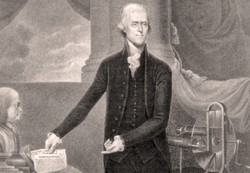Thomas Jefferson Speech
|
| updated |
Copy Link Code
|
 The election of 1800 was not fully decided until February of the next year. Two challengers, Aaron Burr and Vice President Thomas Jefferson, were tied at 73 electoral votes while the incumbent, President John Adams, had lost his bid for a second term. The decision went to the House of Representatives where Jefferson's ally and Burr's chief rival, Alexander Hamilton, pushed the election in favor of his old friend. On March 4, 1801, Thomas Jefferson inauguration as the third President of the United States was held in the new federal capital of Washington, DC. Jefferson would be the first president inaugurated in the Capitol building in what is now known as the Old Supreme Court Chamber. The former president, Adams, had vacated the city earlier that morning upon news of his son's death from severe alcoholism. It would be the first time that a United States President would skip the inauguration of his successor. Thomas Jefferson speeches had already become known in the Virginia House of Burgesses and Continental Congress as well written, powerful pieces that tended to be delivered less voraciously. Indeed, Jefferson was not a fiery orator like many other Founding Fathers, but his words were chosen carefully and the Thomas Jefferson first inaugural address is a supreme example of his ability as a wordsmith and healer of political divide.
The election of 1800 was not fully decided until February of the next year. Two challengers, Aaron Burr and Vice President Thomas Jefferson, were tied at 73 electoral votes while the incumbent, President John Adams, had lost his bid for a second term. The decision went to the House of Representatives where Jefferson's ally and Burr's chief rival, Alexander Hamilton, pushed the election in favor of his old friend. On March 4, 1801, Thomas Jefferson inauguration as the third President of the United States was held in the new federal capital of Washington, DC. Jefferson would be the first president inaugurated in the Capitol building in what is now known as the Old Supreme Court Chamber. The former president, Adams, had vacated the city earlier that morning upon news of his son's death from severe alcoholism. It would be the first time that a United States President would skip the inauguration of his successor. Thomas Jefferson speeches had already become known in the Virginia House of Burgesses and Continental Congress as well written, powerful pieces that tended to be delivered less voraciously. Indeed, Jefferson was not a fiery orator like many other Founding Fathers, but his words were chosen carefully and the Thomas Jefferson first inaugural address is a supreme example of his ability as a wordsmith and healer of political divide.
Since the retirement of George Washington from public life, politics took an ugly turn in the United States and seemed to threaten the very nature of its republican democracy. As Vice President under the federalist Adams administration, Jefferson slowly became the leader of the opposition party of Republican-Democrats. In 1798, the passing of the Alien and Sedition Acts put hundreds of Americans in prison for voicing their dissent in a time when fears of a second revolution similar to the one in France were haunting the rich and powerful. As the leader of the opposition, Jefferson's electoral victory may have frightened a large and influential portion of the voting population. For President-elect Thomas Jefferson, speech writing was his greatest weapon in the fight to hold the nascent nation together. The first Thomas Jefferson inaugural address was designed to assuage the fears on both sides, that he would not impose the Sedition Acts upon his rivals and that he would not give up his allies' cause and succumb to the temptation of absolute power.
A Thomas Jefferson first inaugural address summary should focus on unique aspects of its body and purpose. The introduction is in line with most political victory speeches of the time and indeed through the present, full of gushing appreciation and forced humility. It is in the middle sections of the speech that we find its most important lines, such as, "We are all Republicans, we are all Federalists." As Jefferson deprecates his own ability in the face of such a large post, he assures the audience that wisdom will be asked of from a wide number of sources. Memorializing the heroes who sacrificed their lives for American independence, Jefferson promises to uphold the civic responsibility of a government to afford freedom to its people. Unfortunately, President Jefferson could not afford that same freedom to the hundreds of slaves on his plantation at Monticello.
